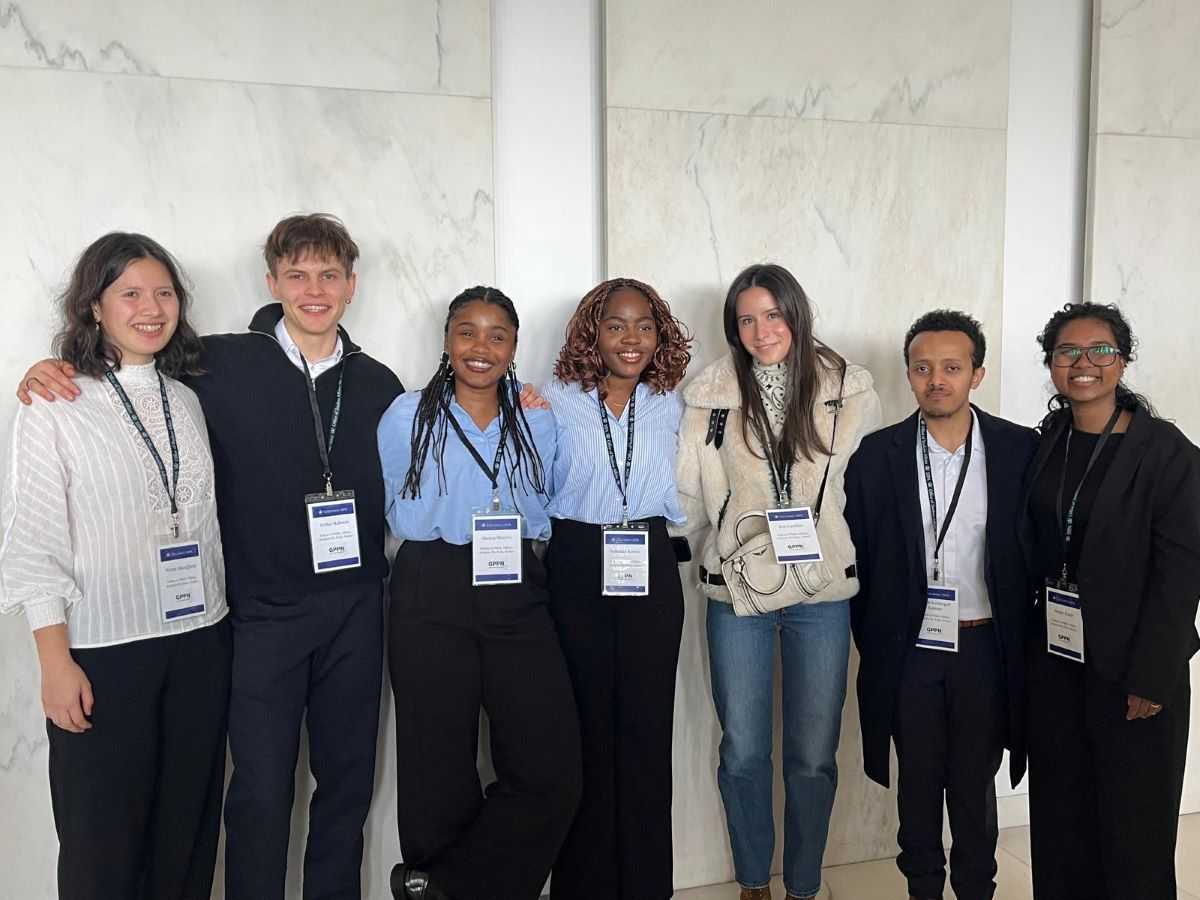Home>Sciences Po students at GPPN annual conference in New York!

27.03.2025
Sciences Po students at GPPN annual conference in New York!
The School of Public Affairs is a member of the Global Public Policy Network (GPPN). Founded in 2005, the GPPN brings together the public affairs schools of eight world-renowned universities (Columbia, LSE, Hertie, GrasPP, Lee Kuan Yew, Fondaçao Getulio Vargas, Munk School, Sciences Po). The network organises an annual conference during which students and deans of member schools exchange on the main global issues related to public affairs. The 2025 edition was hosted in New York by Columbia University's School of International and Public Affairs (SIPA). Two of our second-year master's students, Maryliz Abolou (Digital, New Technology & Public Policy stream) and Aurore Sobngwi (Global Health Policy stream), travelled to participate in this conference. Their project secured second place in the competition! Here, they share their experience.
Why did you decide to apply to the GPPN?
Maryliz: We applied to the Global Public Policy Network (GPPN) for several reasons. Firstly, this conference represents an exceptional opportunity to engage with students from the most prestigious public affairs schools, to challenge our ideas, and to broaden our understanding of global challenges. Participating in this competition, focusing on themes we are passionate about, allows us not only to deepen our knowledge but also to test our ability to propose innovative solutions.
Aurore: Indeed, this participation holds particular significance for us, as it enables us to co-develop a project together, with one of my best friends. This collaborative work is a meaningful way to conclude our respective master's programmes by applying the skills acquired throughout our studies at Sciences Po. Working together on an ambitious project has given us the opportunity to combine our respective expertise in health and digital technology to propose a concrete solution to a real problem.
What project did you choose to present, and why did you select this particular theme?
We chose to present YAO – Your Accessible Online Health Platform, an initiative aimed at improving access to healthcare and the management of medical records in Côte d'Ivoire through an innovative digital platform.
Aurore: Specialising in health policies, I have been particularly aware of the major challenges faced by vulnerable populations, especially in rural areas. Limited access to healthcare infrastructure and fragmented medical data are significant obstacles to effective patient care.
This project aligns with my desire to contribute to the development of more inclusive and better-structured health systems. The idea for YAO emerged from a thorough reflection on digital solutions that could address issues of accessibility, coordination, and efficiency in healthcare. Implementing a centralised digital system would not only improve patient management but also optimise public health decision-making through better utilisation of medical data.
Maryliz: My interest in digital transformation and my expertise in new technologies led me to consider how digital solutions could enhance the healthcare sector in Côte d'Ivoire. Digitising health services is both a priority and a major challenge. By working on YAO, we were able to leverage our skills to design a platform that meets specific on-the-ground needs while ensuring optimal accessibility and security. This theme combines our respective areas of specialisation and addresses an urgent issue. The potential impact of YAO is immense: by facilitating access to care, improving coordination among healthcare professionals, and securing medical data, our solution can truly transform the daily lives of the most vulnerable populations.
Your project secured second place in the competition. What makes it innovative?
Maryliz: The innovation of YAO lies in its integrated approach tailored to local realities. Unlike existing systems, which are often inaccessible or unsuitable for limited infrastructures, our solution is based on a mobile and web platform centralising patients' medical records. We have incorporated advanced features such as health data interoperability, teleconsultation, and personalised follow-up through automated notifications for treatments and medical appointments.
Furthermore, the use of artificial intelligence algorithms optimises the management of health resources by facilitating the analysis of epidemiological trends and enhancing decision-making by health authorities. We have also prioritised ensuring a high level of data security by design, using advanced encryption protocols to maintain patient information confidentiality.
Aurore: One of the most innovative aspects of YAO is its co-construction approach and adaptability to local contexts. We designed a system that can operate even in areas with limited internet access, integrating offline solutions and partnerships with telecom operators to ensure optimal coverage.
Additionally, we included a training component to support healthcare professionals in adopting this technology, ensuring effective and sustainable use of the platform. Finally, the interconnection between health facilities allows for better coordination of care, avoiding redundancies and improving long-term patient management.
What skills have you gained from participating in the GPPN conference?
Aurore: Our participation in the GPPN conference has enabled us to develop key skills both professionally and personally. We have strengthened our ability to manage a project from start to finish, from structuring the idea to its concrete development, while optimising our work under time constraints. Presenting our project before an international jury has improved our communication and argumentation skills, refining our ability to defend our ideas with clarity and impact.
Maryliz: This experience has also pushed us to deepen our analysis of public policies and to better understand the issues related to digital innovation in health, integrating the needs of various stakeholders. Collaborating on this project has enhanced our team spirit and leadership, allowing us to combine our respective expertise to maximise the effectiveness of our solution. Finally, we have learned to adapt and to demonstrate critical thinking by incorporating feedback from mentors and the jury to refine our proposal. Ultimately, this experience has reinforced our shared commitment to driving positive change through innovative and inclusive public policies.
